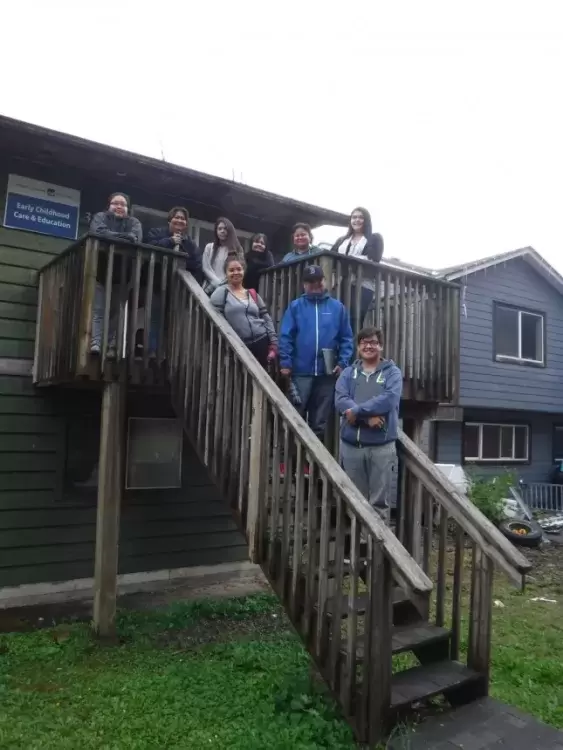An in-community training partnership between the Tla-o-qui-aht First Nation and North Island College (NIC) will help provide nine new qualified early childhood educators to the west coast.
Tla-o-qui-aht Education Manager Iris Frank said west coast communities benefit from having more credentialed early childhood educators.
“Limited access to childcare has a big impact on families, whether it’s a parent’s ability to work, or go to back to school to train for a new career,” said Frank, who originally approached NIC about bringing the program to Vancouver Island’s west coast.
Having more qualified childcare providers enables more people to work or return to school, which in turn, benefits the entire community, she said.
In the past, the Tla-o-qui-aht First Nation have struggled to provide child care because the high cost of living in Tofino and on the west coast limits people from living in the area.
In December 2017, the Tla-o-qui-aht completed a new 42-child daycare and preschool but was unable to open it right away because of a lack of certified Early Childhood Education (ECE) staff members.
The nine students enrolled at the in-community ECE program on the west coast are set to complete their training in April 2019.
North Island College has a long history of providing in-community training in rural communities. Early childhood educators provided training in Ahousaht in 2015 and 2016, where 10 students graduated from the program. The Tla-o-qui-aht program will be the second time NIC has provided training to a community on the west coast.
Theresa Gereluk, department co-chair and instructor in NIC’s Early Childhood Care and Education (ECCE) program, said the First Nations communities reached out to the college after identifying the need to early childhood educators in their area.
“One of the things NIC is very committed to is doing different in-community offerings, different programs that are actually identified by the communities as a need,” Gereluk said. “So NIC doesn’t identify it, the communities do.”
Gereluk said offering training where people live, rather than making students travel to their nearest campus, makes a big difference to student success.
“The students have identified that it’s important to them because all their family supports are here,” Gereluk said. “They can still be around for their families when they need them and that to them was so incredibly important because whether I’m in Ahousaht or whether I’m in Esowista, the first thing that often people will say is, family is first in their lives.”
Having in-community training, Gereluk says, breaks down the barrier for students having to travel to an unfamiliar place away from their family, friends and community supports.
Another point that is really important to [students] is in the communities on the west coast there’s childcare embedded in all of those communities, so their children can be cared for by people that they are familiar with,” Gereluk said.
After students finish their training, they will complete 500 hours of work experience and then be able to apply for their five-year Early Childhood Education certification.
“They’re just finishing up their first practicum now, so they get to go out three different times for different lengths and they get to work in the childcare centres within their communities or the communities close by,” Gereluk said. “Their training and their learning has a real richness of the communities woven through it instead of them leaving and being introduced to the childcare environment in another community.”
Student Donna Louie lived in Vancouver for 22 years, where she felt out of touch with her culture. The experience was a “very expensive, busy, high stress, booming time in my life full of distractions,” she said in a press release from NIC. “When I finish this program, I look forward to learning more about my culture and participating with cultural gatherings as I feel we lost this when I was young.”
Louie jumped at the opportunity to join the program and plans to work in a local First Nations-run daycare on graduation.
“It is important for ECCE to be here on West Coast, Esowista in Ucluelet/ Tofino because I feel both Ucluelet First Nation and Tofino’s First Nation members see us work hard to become active role models to the children in our community. I feel so proud that I am inspiring others that have told me they want to take ECCE now.”
The partnership is possible with funding from the Canada BC Jobs Grant secured by the Tla-o-qui-aht First Nation, as well as their in-kind support.







